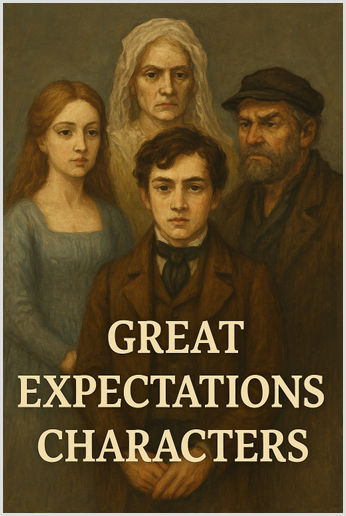Charles Dickens published Great Expectations in 1861. One of his most celebrated works, it tells the story of young Pip, an orphan living in the Kent marshlands. His life takes a sudden turn when he meets the escaped convict Abel Magwitch and later receives a fortune from an anonymous benefactor. This newfound wealth thrusts Pip into a new social class, and the novel explores this transformation, filled with ambition, love, heartbreak, and self-discovery.
Many of the characters have memorable personalities. Estella is proud and enigmatic. Pip is in love with her. Miss Havisham is eccentric and wealthy, wearing her old wedding dress ever since she was jilted at the altar. Abel Magwitch is a convict who is more complex than he appears. Dickens uses these characters to explore themes that include social mobility, moral growth and the illusion of wealth and status. Pip's interactions with these people shape his identity and challenge his understanding of how to become a gentleman.
This guide will explore the central characters in Great Expectations, including their background, personality and significance to the plot. If you need extra help learning this work, TeachTutti has experienced GCSE English Literature tutors who can provide personalised support, such as preparing revision notes.
Pip - Protagonist
Pip is the protagonist and narrator of Great Expectations. As an orphan, Pip is raised by his harsh sister and her kind husband, Joe Gargery. Pip's humble beginning in a small village is upturned when he unexpectedly meets the convict Abel Magwitch. Pip doesn't discover until much later that Abel secretly funded his transformation into a gentleman. Pip uses this wealth to move to London and pursue the significant lifestyle he has always dreamed of. However, this is at a great personal cost.
Pip struggles with his desire for status and social acceptance, with the genuine affection of characters who are now below his new standing. Dickens stresses the mistakes and gradual understanding as Pip slowly recognises the far greater worth of kindness, loyalty and humility over personal wealth. He has a complex relationship with Estella, whom he loves despite her coldness, and Miss Havisham, who manipulates these very emotions. This is in stark contrast to the characters who truly care for him, furthering Pip's self-awareness.
Key character traits:
- Ambitious - Pip longs to become a gentleman and is often blind to genuine affection. For example, he decides to leave his brother-in-law Joe to pursue a better life in London: "I want to be a gentleman."
- Reflective - Pip realises the true worth of his loved ones in their loyalty and kindness. We can see this when he reconnects with Joe later in the novel: "I have been bent and broken, but—I hope—into a better shape."
Estella - Enigma
Estella is arguably the novel's most intriguing and complex character. She is adopted by the manipulative Miss Havisham, who teaches her to reject genuine emotions as a means to exact revenge against men. Pip falls in love with Estella, but she marries the cruel nobleman Drummle.
Estella is cold towards Pip, dismissing his advances while suggesting a deeper vulnerability to her character. She is presented by Dickens as an antagonist but also a victim due to her upbringing by Miss Haversham. The reader is prompted to question if true change is possible when raised in the way Estella has experienced. Estella's relationship with Pip also represents several themes in the novel, including class tension and the complexities of love in Victorian England.
Key character traits:
- Cold and proud - Estella is taught to reject and hurt men. For example, she is cruel towards Pip, dismissing his affections: "I have no heart... I have no softness there."
- Victim of upbringing - She struggles with the identity imposed upon her by Miss Havisham. Estella is aware of this emotional emptiness, stating: "I am what you have made me."
Miss Havisham - Ghost of lost love
Miss Havisham represents grief, bitterness and revenge. She was jilted by her fiancé Compeyson, who conspired with her half-brother Arthur to steal her money and leave her at the altar. Following this humiliation, she becomes a recluse and remains frozen in time: she wears her faded wedding dress and all clocks are stopped at 8.40, when she was betrayed. Her mansion, Satis House, represents this emotional decay, with the "rotted bride-cake" a symbol of Miss Havisham's heart.
Dickens illustrates the destructive power of melancholy and dwelling on past wrongs through Miss Havisham. She manipulates her adopted daughter Estella, raising her to punish men by being cold and emotionally cruel. This influence impacts Pips, warping his understanding of love and aspiration. She is a complex character and shows vulnerability later in the novel when she regrets her actions.
Key character traits:
- Bitter and vengeful - She raises Estella to punish men for how she was treated. For example, Estella breaks Pip's heart: "Love her, love her, love her!"
- Tragic - Her life is trapped in the past sorrow of her wedding bed. This is represented through her decaying mansion, frozen in time: "Break their hearts, my pride and hope."
Abel Magwitch - Convict and redemption
Abel is a surprising character in Great Expectations. He is introduced as a frightening, intimidating convict trying to escape capture in the Kent marshes. He meets a young Pip visiting the graves of his parents and siblings. Pip steals tools from Joe and food meant for Christmas dinner after being threatened by Abel. We later learn that Magwitch - grateful for Pip's childhood kindness - secretly becomes his benefactor, dramatically altering Pip’s life.
Magwitch’s character arc is heartening, Dickens implying that people who have been criminals still have inherent humanity and can redeem themselves. Magwitch is loyal, generous and displays genuine affection to Pip, despite his outward appearance, manner and criminal past. When Pip reunited with Abel, he was forced to acknowledge his prejudices and perceptions of social class and moral worth. Ultimately, the possibility of redemption and the power of kindness make Magwitch indispensable to the novel's moral message.
Key character traits:
- Grateful - Abel dedicates his life to repaying Pip’s childhood kindness, by secretly financing his rise in society: "Look'ee here, Pip. I'm your second father."
- Redeemed - He shows moral growth despite his background and gains the respect and affection of Pip: "You've been more comfortable alonger me, since I was under a dark cloud."
Joe Gargery - Loyalty and true gentility
Joe Gargery is Pip's brother-in-law. He is a father figure for Pip, a symbol of genuine kindness and humility. Joe works as a blacksmith and is steadfast in his support, warmth and patience of Pip. This contrasts with the superficial values Pip encounters in London. Dickens implies through Joe that true gentility is found in a person's integrity and goodness, not their wealth and status.
Joe remains loyal to Pip, even when Pip becomes distant and ashamed of his humble origins. He is mistreated by Pip's harsh sister, but he remains compassionate and optimistic, with emotional strength. Pip learns the importance of genuine friendship and unconditional love through the wisdom and forgiveness of Joe, when Joe pays off his debt and nurses him back to health despite Pip's emotional distance.
Key character traits:
- Loyal and kind - Joe supports Pip unconditionally. For example, he cares for Pip after his illness: "Ever the best of friends, ain't us, Pip?"
- Humble - He represents true gentility and moral integrity, such as maintaining his dignity when treated poorly: "I'm wrong in these clothes."
Herbert Pocket - True friendship
Herbert Pocket meets Pip as a young boy at Miss Havisham’s house. He regards him as a "pale young gentleman", and they have a brief fight. Despite this, they become close friends when they are older and living in London. Herbert is cheerful, optimistic and ambitious. He is a confidant for Pip, offering guidance, companionship and honesty without any strings attached.
Herbert's aspirations are modest: he wants to become a successful merchant. This contrasts with Pip's illusions of grandeur and serves as a subtle critique by Dickens of the Victorian obsession with wealth and class. Herbert consistently steers Pip towards moral clarity and emotional maturity. He follows Herbert to Egypt near the end of the novel and learns the true meaning of friendship, loyalty and humility through this relationship.
Key character traits:
- Honest and optimistic - Herbert is a genuine friend to Pip. For example, he helps Pip navigate London life sincerely: "We are friends, Pip."
- Sincere ambitions - He wants to be a successful merchant, a realistic dream without pretension: "A capitalist—an Insurer of Ships."
Minor characters - Biddy, Mr. Jagger, Wemmick
The minor characters in Great Expectations provide depth, humor and moral perspective. Mr. Jaggers is a formidable lawyer with cold practicality. Wemmick is Jaggers’ clerk and is able to separate his professional life from a warm, eccentric home life. The latter character provides insights into the complexities of Victorian society.
Biddy is a loyal, childhood friend of Pip. He represents sincerity and emotional intelligence, quietly guiding Pip toward self-reflection. By comparison, Bentley Drummle is Pip’s arrogant rival for Estella’s affection - he represents the negative aspects of privilege and social expectation. Dickens uses these characters to highlight key themes, reflect the context of 19th-century England and reinforce Pip's personal growth during the novel.
Key traits of minor characters:
- Biddy - He is wise and compassionate, guiding Pip. For example, he gives Pip advice about his ambitions: "Are you quite sure, then, that you WILL come to see him often?"
- Mr Jaggers - A pragmatic, detached lawyer. He reflects the harsh social realities, such as how he manages Pip’s financial affairs without warmth: "Take nothing on its looks; take everything on evidence."
- Wemmick - He is cold at work, yet warm and quirky at home, managing to keep both lives separate from the other: "Walworth is one place, and this office is another."
Conclusion: Characters in Great Expectations
The characters in Great Expectations embody lessons about humanity, morality and society. Pip's experiences with characters including Estella, Miss Havisham, Magwitch and Joe Gargery encourage the reader to reflect on complex themes, including social class, ambition and redemption. Character analysis is an important aspect of GCSE English Literature exams, and we recommend you choose at least one plot example and quote for each character.
For further reading, you can learn the historical context of Great Expectations from Sparknotes. In this article by BBC Bitesize, you can also learn about the writing style in Great Expectations.
If you need further guidance, don’t hesitate to get support from TeachTutti’s experienced GCSE English Literature tutors. Every tutor has an enhanced DBS check, and lessons can be in-person or online at a time convenient to you.
This post was updated on 30 Nov, -0001.

